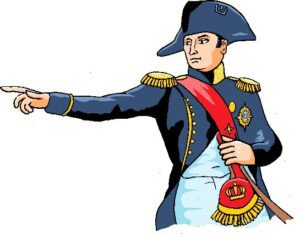 Why do great people keep making the same mistake again and again?
Why do great people keep making the same mistake again and again?
In 1812 the brilliant leader, strategist and general, Emperor Napoleon Bonaparte as the head of the massive French army invaded Russia.
However, he was unprepared for an extended winter campaign, which eventually led to his fall, and that of his French Empire.
A big mistake!
Then, believe it or not, 120 odd years later Adolf Hitler did the same thing!
 He invaded Russia, and, exactly as before, he was unprepared for an extended winter campaign.
He invaded Russia, and, exactly as before, he was unprepared for an extended winter campaign.
It had exactly the same a result, it led to his downfall as it did to the German Reich.
Why do these seemingly intelligent people keep making the same mistake again and again?
That’s why we want to make history fun and have published 30 historical musicals, that hopefully everyone will perform, remember and hopefully use in later life.
There are so many such examples of history repeating itself, if only we understood the mistakes of history, we wouldn’t keep making them.
We hope!
For example, why did the US, then NATO and even the USSR go into Afghanistan? They all lost thousands of men, didn’t win anything and we are now back in the same place
No army has ever won in Afghanistan, even in the eighteenth century we were losing men there, so you have to ask, did all these politicians ever read history?
To help them learn our sister site Educational Musicals has published two popular shows
THE WARRIOR QUEEN
 Learn all about Queen Boadicea and her battles with The Roman Empire, it’s a great script with 12 catchy songs that your children will absolutely love.
Learn all about Queen Boadicea and her battles with The Roman Empire, it’s a great script with 12 catchy songs that your children will absolutely love.
Just clck on The Warrior Queen.
THE BATTLE OF BRITAIN
is a fantastic show created especially for children, with an exciting and fun script and 12 amazing songs. Find out more at where you can see samples of script and listen to excerpts from the score clip on The Battle of Britain.
Isn’t history fun?
10 questions to discuss:
- Beyond Napoleon and Hitler, are there other historical examples of leaders making similar mistakes despite past failures? Consider political, military, or even business contexts.
- What factors contribute to leaders overlooking or underestimating historical warnings? Explore factors like hubris, ideology, misinterpretations of history, or simply ignoring inconvenient truths.
- Are there different categories of “repeating mistakes” in history? Consider recurring strategic errors, misinterpretations of cultural dynamics, or societal blind spots regarding technological advancements.
- Can we draw parallels between individual leader decisions and broader societal or cultural tendencies to repeat mistakes? Analyze cases where systemic pressures or ingrained biases contribute to repeating errors.
- Are there cases where “repeating mistakes” leads to positive outcomes or unintended learning? Consider historical situations where past failures paved the way for future successes or adaptations.
- How can we encourage a deeper understanding of history within leadership positions and policy-making circles? Explore educational initiatives, historical analysis models, or even creative approaches like your musicals.
- Is it always a “mistake” to repeat past actions? Consider situations where revisiting old strategies in new contexts or with different adaptations can prove effective.
- What are the limitations of using historical comparisons to predict or understand future events? Analyze the dangers of simplistic analogies and the importance of considering unique historical contexts.
- How can we balance the lessons of history with the need for innovation and adaptation in a constantly changing world? Avoid falling into rigid adherence to past models while maintaining awareness of potential pitfalls.
- Can we ever truly “break the cycle” of repeating mistakes in history, or is it an inevitable element of human experience? Discuss the role of individual accountability, collective learning, and facing uncomfortable truths about past failures.
These questions encourage critical thinking and go beyond a simplified view of history repeating itself. They delve into different factors, exceptions, and complexities surrounding this intriguing phenomenon.
Try these sites with questions about this:
© Tony Dalton


